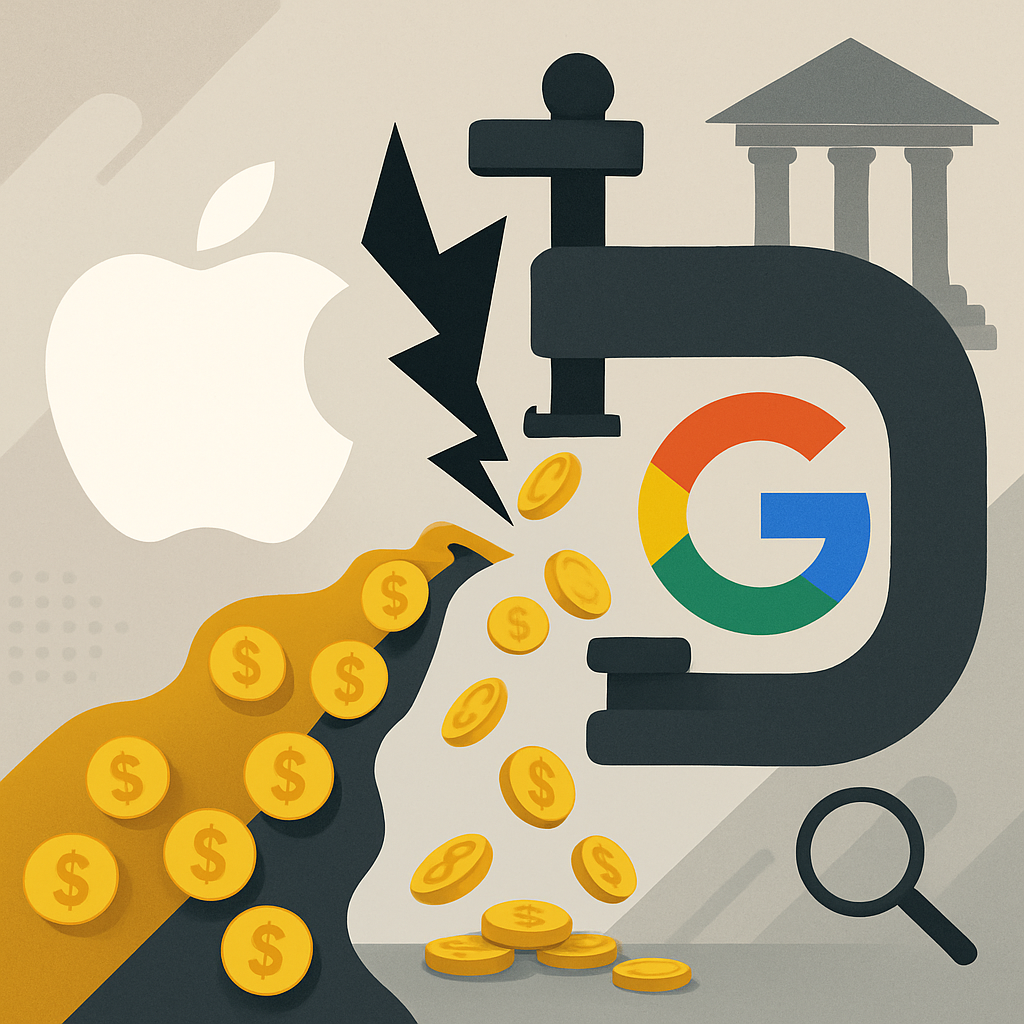JPMorgan Warns of Major Revenue Impact from DOJ’s Google Monopoly Ruling
Apple faces potential annual revenue losses of up to $12.5 billion if federal courts prohibit Google from maintaining its default search engine status on Apple devices, according to a new warning from JPMorgan analysts. This substantial financial exposure—representing approximately 15% of Apple’s earnings per share—underscores the iPhone maker’s vulnerability as antitrust remedies targeting Google’s search monopoly move toward final implementation.
The High-Stakes Google-Apple Partnership
The tech giants’ lucrative relationship has become a focal point in the Department of Justice’s landmark antitrust case against Google. Currently, Google pays Apple between $15 billion and $20 billion annually, with some estimates reaching $28 billion globally, to secure its position as the default search engine across Safari and other Apple platforms.
According to JPMorgan’s analysis, Apple receives approximately $12.5 billion specifically from U.S. customer traffic as part of these Traffic Acquisition Costs (TAC). This revenue stream has become critical to Apple’s Services segment profitability, making any disruption a significant concern for investors and stakeholders.
Antitrust Timeline: Key Dates and Developments
The Legal Journey So Far
The DOJ’s antitrust case against Google reached a crucial milestone in 2023 when Judge Amit Mehta ruled the search giant liable for anticompetitive conduct in general search services. Following a remedies trial that concluded in May 2025, the tech industry now awaits Judge Mehta’s final judgment, expected in early August 2025.
The government has demanded sweeping structural changes, including:
- Forcing Google to divest its Chrome browser
- Eliminating exclusive distribution deals with device manufacturers like Apple
- Implementing measures to restore competition in the search market
What’s at Stake for Apple
These potential remedies directly threaten Apple’s substantial revenue stream from Google, forcing the company to consider alternative strategies for maintaining Services segment growth without relying on search engine partnerships.
Three Potential Scenarios: From Worst-Case to Most Likely
Scenario 1: Complete Prohibition (Worst-Case)
JPMorgan’s most severe scenario envisions Google being entirely prohibited from making distribution payments to secure default search status. This outcome would eliminate Apple’s entire $12.5 billion in U.S.-based TAC revenue, creating a significant gap in the company’s financial projections.
Scenario 2: Partial Restrictions (Middle Ground)
A moderate approach might include:
- User choice screens allowing customers to select their preferred search engine
- Partial restrictions on Google’s default status across select Apple devices
- Modified payment structures that comply with antitrust requirements while preserving some revenue sharing
Scenario 3: Minor Adjustments (Most Likely)
JPMorgan considers this the most probable outcome, involving moderate remedies that preserve much of the current arrangement while introducing minor adjustments to Google’s search practices. This scenario would maintain the majority of Apple’s current revenue stream while addressing legal concerns.
Market Impact and Strategic Implications
Apple’s Financial Resilience
Despite the potential revenue loss, analysts note Apple’s substantial financial resources position the company to weather significant disruptions. The tech giant could potentially:
- Absorb revenue losses through other business segments
- Negotiate alternative deals with competitors like Microsoft Bing or DuckDuckGo
- Develop proprietary search capabilities to reduce dependence on external partners
Industry-Wide Ramifications
The outcome of Judge Mehta’s August ruling could fundamentally reshape the digital advertising landscape, affecting not only Apple and Google but the entire tech ecosystem. Companies across the industry are closely monitoring developments as they prepare for potential changes in partnership structures and revenue models.
What This Means for Investors and Consumers
Investment Considerations
For Apple investors, the Google search deal represents both an opportunity and a risk. While the current arrangement provides substantial revenue with minimal operational overhead, its dependence on external partnerships creates vulnerability to regulatory changes beyond Apple’s control.
Consumer Impact
Depending on the final ruling, consumers might experience:
- More choice in default search engines on Apple devices
- Potential changes in the integrated search experience across Apple’s ecosystem
- Possible shifts in how search results and advertising are presented on iOS devices
Looking Ahead: Preparing for Change
As the tech industry awaits Judge Mehta’s decision in early August 2025, Apple continues developing strategies to diversify its Services revenue beyond the Google partnership. The company’s substantial resources and innovative capabilities position it to adapt to whatever regulatory changes emerge from this landmark antitrust case.
The outcome will likely serve as a precedent for future technology partnerships and could influence how major tech companies structure their distribution agreements moving forward. For Apple, successfully navigating this transition while maintaining Services segment growth will be crucial for long-term financial stability and investor confidence.







